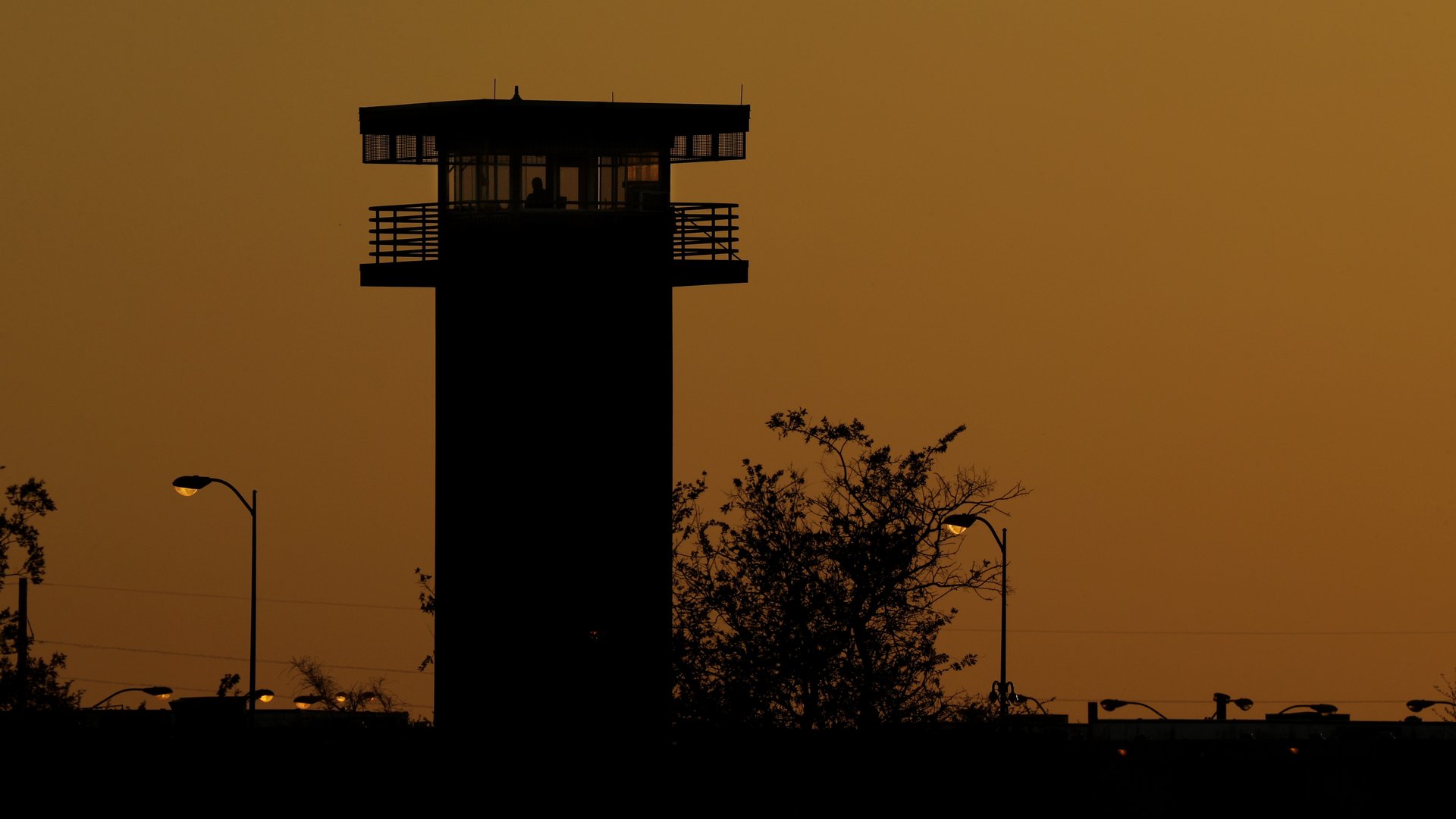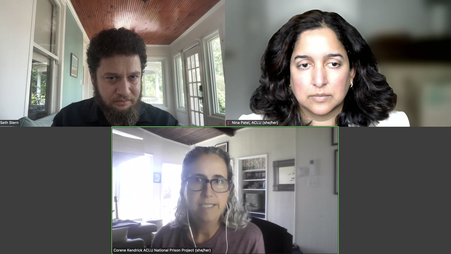With the Trump administration throwing its abductees in shady jails and prisons from Louisiana to El Salvador, it’s essential that incarcerated journalists and whistleblowers are able to expose the conditions they’re dealing with. That is, unless you trust Donald Trump’s cronies to admit to abuses.
But incarcerated journalists nationwide face relentless retaliation for speaking truth to power, and they’re systemically obstructed from seeking recourse from the courts.
After I reported on Texas prison officials’ inadequate response to the COVID-19 pandemic, I was charged in bogus disciplinary cases, repeatedly transferred to different prison facilities, tossed into solitary confinement, assaulted with chemical agents, and held in a cell for weeks without basic necessities, like soap, toothpaste, deodorant, a mattress, and writing supplies.
When all my administrative complaints failed to stop the infringement upon my constitutional rights by rogue prison officials, I turned to my only other option — the federal courts.
Being a layman of the law, I failed to realize that my decision to file a civil rights lawsuit against prison officials came with insurmountable judicial hurdles and dire consequences. It was an awkward and untimely introduction to the Prison Litigation Reform Act.
Signed into law by then-President Bill Clinton in 1996, the PLRA placed extreme restrictions on incarcerated individuals’ ability to file, win, or settle civil rights lawsuits. Lawmakers argued that there were too many frivolous lawsuits against the government.
But the law severely obstructed the pathways for all incarcerated individuals to obtain justice and crippled incarcerated journalists’ ability to make human rights violations known to the public.
Jeremy BusbyThe Prison Litigation Reform Act severely obstructed the pathways for all incarcerated individuals to obtain justice and crippled incarcerated journalists’ ability to make human rights violations known to the public.
Historically, the federal courts were a major source of oversight for prisons and jails. In my home state of Texas, civil rights lawsuits filed by a handful of prisoners led to the class action litigation, Ruiz v. Estelle, that completely transformed the deplorable conditions inside Texas prisons and restored incarcerated constitutional rights.
Judge William Wayne Justice presided over one of the longest periods of federal judicial oversight of a prison in U.S. history, issuing a consent decree that spanned over three decades.
The Ruiz litigation, despite being credited as one of the glaring examples of judicial checks on violations of constitutional rights, would not have stood a chance today.
The PLRA imposes strict challenges on incarcerated litigants that are oftentimes impossible to meet. These limits force the court to dismiss the vast majority of legitimate complaints from incarcerated individuals over the smallest technical issues.
For incarcerated journalists, the unavailability of recourse when they’re retaliated against — as they so often are — exponentially increases the “chilling effect” of potential retaliation. The message is, if you criticize us in your writing, we can do whatever we want to punish you and, with the PLRA, there won’t be anything you can do about it.
Struggling with the ‘exhaustion doctrine’
The exhaustion doctrine mandates that all incarcerated individuals first present each of their grievances to prison administrators through the internal grievance system before suing. If they don’t, the courts are required to dismiss the lawsuit immediately.
This rule fails to consider how prison internal grievance systems are littered with indirect and direct obstructions. Accessing the approved grievance form, meeting deadlines, understanding the grievance process’s convoluted rules, and getting the grievance to the proper prison official are easier said than done.
For example, after I was transferred to three different prisons in five days and tossed into a solitary confinement cell without any personal property, I was a drowning man without a life preserver.
First, I knew none of the staff or incarcerated individuals to enlist them to provide me with an approved grievance form and a pen so I could fill it out.
Secondly, if I was successful in obtaining the form and a pen, the grievance rules only permit me to raise "one issue" per grievance, and one grievance per week, so I have to make the unfair decision of which constitution violations to seek redress for and which ones to overlook. If I cite two violations in one grievance I violate restrictions placed by the PLRA. Texas prison grievance rules allow only 15 days to file grievances about any violation.
Finally, after overcoming those hurdles, I would have to rely on the same guards who were responsible for the violations to process my grievance form, since I was locked in solitary confinement, prohibiting my access to the grievance staff or the designated filing box. There is no system set up to confirm if a grievance has been processed or not. The smallest misstep in this process renders your lawsuit moot by PLRA.
Insurmountable obstacles for legal layman
While I was a staff reporter at the prison newspaper, I was instructed to write all my articles on an eighth grade level. That was the level at which prison officials felt that an average incarcerated individual reads. I have a degree from the University of Houston-Clear Lake, and yet when I made the decision to file my civil rights complaints I could barely make sense of all the rules and statutory language of the courts.
Prison law libraries are stocked with complex and outdated legal books. Simplified DIY books are not available. There is no road map for where to begin. The PLRA requires that specific procedures are followed, which include very tight deadlines. Not understanding and following all of these procedures will result in the dismissal of an incarcerated individual’s lawsuit.
Very few incarcerated individuals, including educated journalists like myself, have the legal aptitude to navigate the complexities of the PLRA.
Jeremy BusbyVery few incarcerated individuals, including educated journalists like myself, have the legal aptitude to navigate the complexities of the Prison Litigation Reform Act.
My lawsuit listed multiple prison officials from four different facilities as defendants. As a result of rules implemented following the passage of PLRA, the federal judge broke my lawsuit up into four separate proceedings and reassigned each of them to four different federal courts.
This process — the opposite of the Ruiz case, where multiple claims were joined together in a class action — completely overwhelmed my already disadvantaged ability to meet all the rigorous rules of the courts.
Despite all of the documented evidence of prison officials violating my constitutional rights by denying me freedom of speech and due process, discriminating against me, and subjecting me to cruel and unusual punishment, my lawsuit was dismissed over a procedural error before the merits were ever considered.
Disincentivizing lawyers from taking cases
Finally, because of restrictions imposed by the PLRA, attorneys are discouraged from taking cases on behalf of incarcerated individuals.
For example, the PLRA dramatically restricts financial compensation incarcerated individuals can be awarded for injuries resulting from constitutional violations, and the legislation places a cap on attorney’s fees incarcerated plaintiffs can recover at 150% of any financial damages awarded.
As the Prison Policy Initiative has explained, that cap is highly restrictive because damages awarded to incarcerated people, in the rare event that their cases get that far, are usually nominal at best.
That results in a mere 7.6% of incarcerated litigants being represented by attorneys in civil rights lawsuits as of 2020, compared to 89.8% of nonincarcerated litigants.
PLRA should be repealed
The PLRA has served no real societal interest since its passage. It has done nothing but stop incarcerated individuals from advocating for their inalienable human rights.
The outrageous abuses inside America’s prisons that have been exposed in recent years should motivate lawmakers to provide incarcerated people with more, not less, access to the legal system. Maybe some incarcerated people file frivolous lawsuits, but so do people on the outside — it’s not a reason to deprive everyone else of legal recourse.
The PLRA’s unreasonable restrictions have bound the hands of federal judges to consider legitimate complaints from incarcerated individuals, hold rogue prison officials accountable, enforce court orders, and compel policy change.
Simultaneously, it unleashed prison officials’ ability to violate incarcerated individuals’ basic constitutional freedoms — including the rights of incarcerated journalists.
It has also restricted the basic function of journalists outside prison, and the taxpayers who read the news, to monitor how public funds are spent.
Outside journalists’ access to incarcerated sources and prison records is severely limited. Trials and court files are among the few places they can find the truth about what goes on on the inside. But when cases are dismissed on technicalities before a judge or jury considers the merits, journalists can’t discern which allegations are true.
Repealing the PLRA is a step toward justice for all. Incarcerated journalists are routinely targeted and subjected to all types of cruelty. Like journalists on the outside who run into oppressive government officials, we depend on recourse from the federal courts to serve as our last line of defense, as our news reporting often does for the incarcerated population and the American public.





